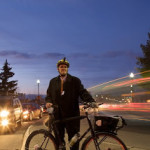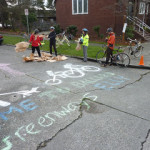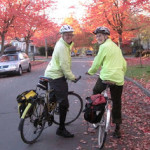
Bicycle Alliance Board Adopts 2011 Legislative Agenda
In the classic 1939 Frank Capra movie about politics in the other Washington, an idealistic Jimmy Stewart bests the establishment with a heart-rending Senate floor speech that shames the cynics and wins the day.
Oh, if only it were that easy.
Affecting the outcome of the political sausage-making process in the real world takes time, planning, advance work, coalition building and plenty of patience. So even though the legislature doesn’t meet again until next January, the Bicycle Alliance has been working on its 2011 legislative agenda since last spring. If you’re interested in helping to create a more bike-friendly Washington, we welcome your support.
The legislative agenda, adopted by the Bicycle Alliance Board at its August meeting, calls for passage of five primary pieces of legislation, as well as support of other legislation to make cycling safer and more convenient.
Priority legislation includes bills that would:
Traffic safety education—require that the driving schools attended by motorists who have received a traffic ticket teach the Department of Licensing’s approved curriculum for safe driving around cyclists and pedestrians. Such legislation was introduced during the 2010 session, but died without final action.
Mutual courtesy and safe passing—clarify the laws that define safe and courteous behavior for cyclists and motorists, including legislation governing how much space motorists should give cyclists when passing alongside them.
Complete streets—create a framework for a grant program to create incentives for communities that adopt a “complete streets” policy to ensure that their streets are designed and built to accommodate cycling and walking. A “complete streets” bill was introduced during the 2010 session, but died without final action.
Lower speed limits—Give communities broader authority to lower speed limits to 20 miles an hour in neighborhoods with high pedestrian and bicycle traffic. Studies in Europe have shown that lower speed limits sharply reduce injuries and death.
Liability—Impose reasonable limits on the liability of communities that sign bicycle routes or produce bike maps. Currently, some communities don’t mark or map routes at all because they fear they will be found liable for injuries suffered by cyclists who use the routes.
In addition to its main priorities, the Bicycle Alliance will also support legislation to better protect vulnerable road users such as cyclists and pedestrians, require the State Dept. of Transportation to include the external costs of driving when assessing the costs and benefits of its projects, and provide adequate transportation funding for cycling and walking.
The priorities will be fine-turned as the legislative session advances. For more background and up-to-date information, visit the Bicycle Alliance legislation and issues page, accessible from our home page at http://www.wabikes.org/.
If you have questions or would like to help advance our legislative agenda, contact Bicycle Alliance Policy Director Dave Janis at 224-9252, extension 302, or at DaveJ@wabikes.org.



